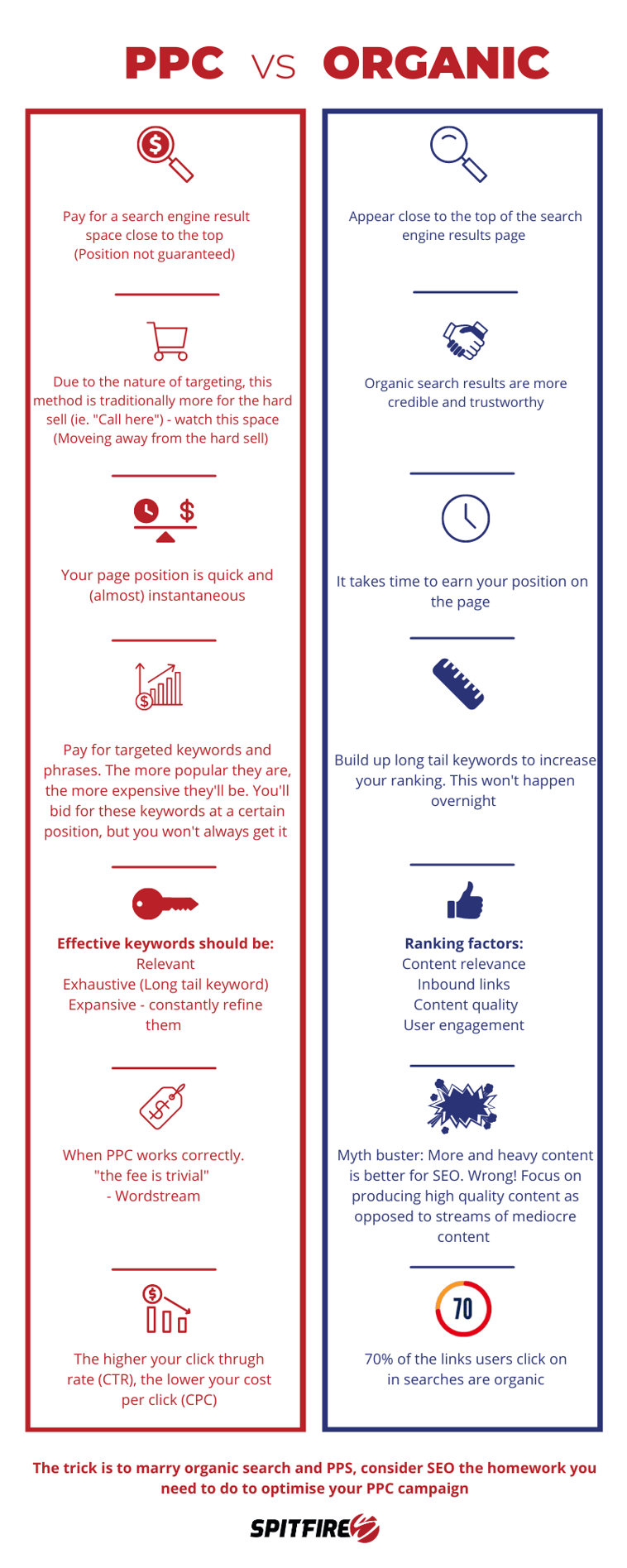In a world of meta descriptions, search engine results, and adgroups, how do you choose the best way to optimise your online marketing? Organic search versus pay per click advertising is something you need to consider.
The digital space is fast moving, and as major digital organisations like Google monetise on the importance of appearing first in search results, the options for brands become more extensive. In our inbound marketing terminology post we hit on some key terms you need to know, but our infographic digs into two key elements for strategic online presence: SEO and PPC. Sound too jargony? Don’t fear. One of the key concerns we hear from clients is around organic search (which works with search engine optimisation, or SEO) and how it compares to and works with pay per click (PPC).
Here’s everything you need to know about PPC and SEO and how they match up

ORGANIC
Appears after the PPC Listing on Search Results Page, however it is important to note that
Organic search results are more credible and trustworthy and take up a lot of time and effort to earn your position on the page. Essentially to rank well, you must position your website as an authority on a particular subject matter.
That is why Organic is best suited to target users that need to take a more considered approach before making a purchase or make a commitment to a brand. When it comes to SEO, good quality content that has a good user experience is critical. What that looks like in the eyes of a search engine can be broken down into the following factors.
Ranking factors:
- Content relevance
- Inbound links (External Links)
- Internal Links
- Content quality
- Page Experience
- Mobile Experience
- Page Speed
Myth buster: More and heavy content is better for SEO. Wrong! Focus on producing high quality content as opposed to streams of mediocre content.
Did you know?
89% of customers begin their buying process on a search engine.
70% of the links users click on in searches are organic.
PPC (Pay Per Click)
The amount of PPC results shown is dependent on “how monetised” this group of search terms are. If it is a highly monetised group of search terms e,g, search terms related to Insurance, half of the page on a mobile device could be taken up by a PPC result. But, if it is a less monetised subject, such as someone searching for factors to consider when choosing a building contractor, then you are more likely to have one or two PPC results.
Due to the nature of PPC targeting, this method is traditionally more for the hard sell (ie. “Call here”) - watch this space (moving away from the hard sell)
Your page position is quick and (almost) instantaneous.
Pay for targeted keywords and phrases. The more popular they are, the more expensive they’ll be. You’ll bid for these keywords at a certain position, but you won’t always get it.
Effective keywords should be:
- Relevant
- Exhaustive (long-tail keywords)
- Expansive–constantly refine them
When PPC works correctly, “the fee is trivial” - Wordstream
Which one is best for my business?
The trick is not to look at Organic search and PPC as two siblings competing for one piece of the pie, but rather as a set of twins, each with their set of advantageous skills, that can complete each other and both help reach the main goal of getting the piece of pie (the customer).
Paid is best suited for:
- Getting the attention of searchers
- Making your business more competitive
- Getting users that don’t need much convincing
Organic is good at:
- Positioning the organisation as a thought leader
- Converting users that need “more convincing”
- Sustaining the interest of a user
- Helping the site rank for a good amount of interrelated keyword themes (subject matters)
Looked at properly, both channels would be important in getting and retaining a customer for most organisations
